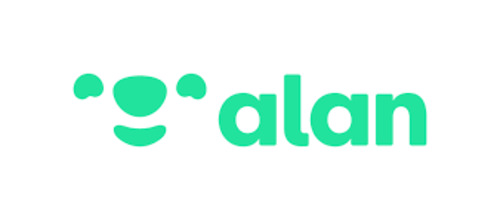Alan ambitionne de se lancer en Europe
L’assurtech Alan a été fondée en 2016 par Jean-Charles Samuelian et Charles Gorintin afin de proposer un service centré sur l’humain. Alors que son offre s’adressait initialement aux travailleurs indépendants, en 2019, la startup a élargi son marché aux particuliers, aux retraités, aux fonctionnaires, aux entreprises de l’hôtellerie et de la restauration, et couvre désormais 76 000 adhérents et 5 000 entreprises.
Outre une inscription en quelques minutes, Alan promet à ses clients de « ne plus courir derrière l’information ». Les utilisateurs qui choisissent de ne pas connecter leur caisse de Sécurité sociale à l’application mobile peuvent ainsi être remboursés par simple envoi numérique de la facture depuis un ordinateur ou un téléphone. En cas de doute, il est possible de poser ses questions sur le chat mis à disposition, avec une réponse apportée sous 48 heures.
Le 20 avril dernier, la jeune pousse a annoncé avoir levé 50 millions d’euros auprès de Temasek, le fonds singapourien entré récemment au capital de Manomano et d’Index Ventures. Au total, depuis son lancement, Alan a levé 125 millions d’euros, un record pour une assurtech française. Ce tour de table va lui permettre d’accélérer son développement en Europe. En effet, Alan, qui a déjà ouvert de nouveaux bureaux en Espagne et en Belgique, envisage de s’implanter dans la plupart des pays européens au cours des 5 prochaines années.
De nouveaux services de santé basés sur la simplicité
Très actif pendant la pandémie de Covid-19, l’assureur a lancé de nouveaux services et notamment un programme donnant accès à un service de télémédecine, un détecteur de symptômes et des outils de gestion du stress. La sortie de la crise sanitaire conduira à « une transition digitale beaucoup plus rapide qu’elle ne l’a été jusqu’à présent », précisent les fondateurs d’Alan dans un communiqué.
Alan s’est fixé comme objectif d’atteindre 500 000 adhérents d’ici 3 à 4 ans. Pour y parvenir, l’entreprise mise sur le déploiement de son offre à l’étranger, mais aussi sur l’augmentation du nombre de services disponibles via son application. Outre l’accès à la télémédecine via un partenariat avec LIVI, les adhérents pourront prochainement rechercher les praticiens de santé disponibles près de chez eux en utilisant Alan Map ou encore s’informer sur les différents sujets de santé en se rendant sur un site similaire à celui mis en œuvre pour le coronavirus.
Ainsi, l’enjeu de la startup est de démocratiser la dématérialisation de l’assurance santé tout en créant un parcours client simplifié et transparent.
